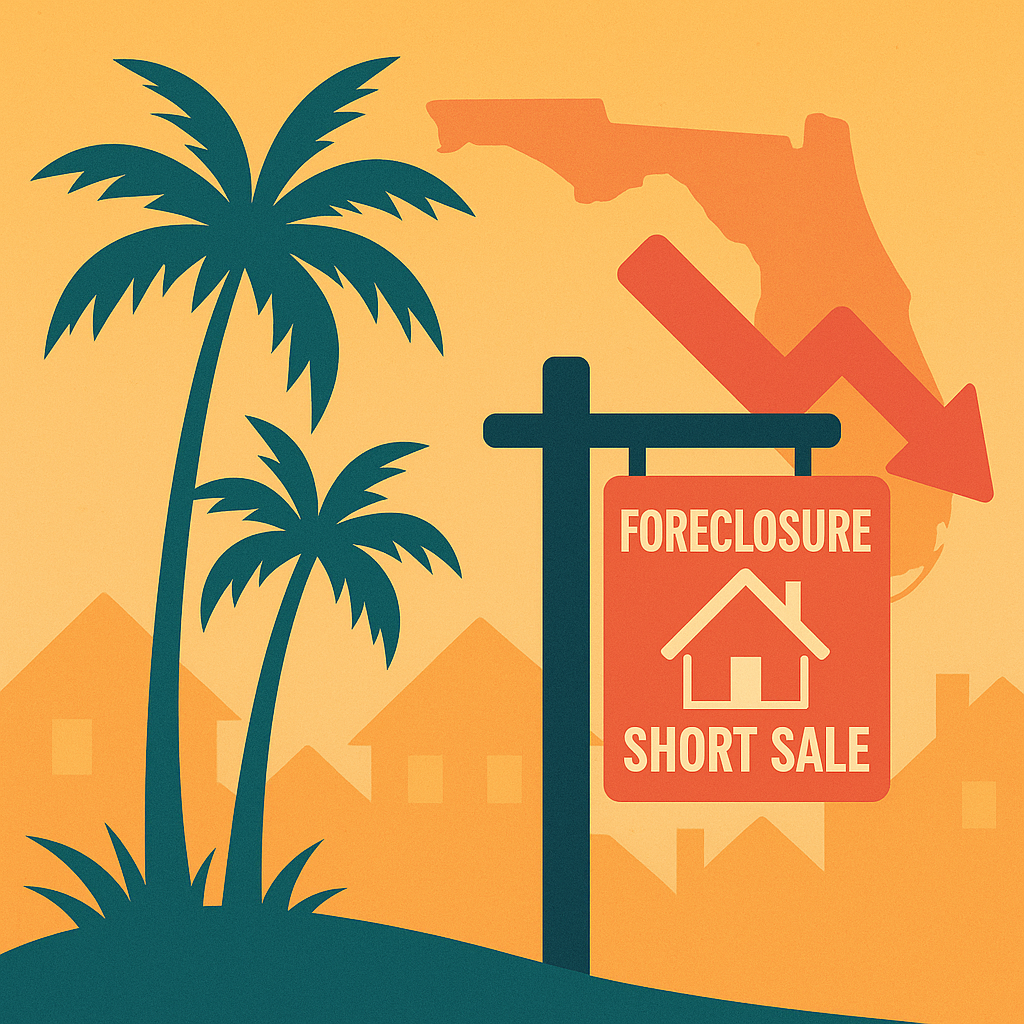Rising Foreclosures in Florida: Why Short Sales Are Back on the Table
In Florida’s housing market, the winds are shifting. After years of relative calm, foreclosure filings across the Sunshine State are once again on the rise. For realtors, investors, and homeowners, that’s more than just a headline; it’s a signal that short sales are coming back into focus as a viable strategy in distressed property transactions. By understanding why foreclosures are increasing and how short sales can help, real estate professionals can better serve their clients while homeowners can avoid the worst consequences of default.
The Florida Foreclosure Surge
For years after the 2008 housing crash, Florida ranked among the states with the highest foreclosure rates in the country. Things improved during the recovery, but new economic pressures are pushing filings upward again. Rising insurance premiums, HOA dues and assessments, and higher interest rates have combined with stagnant wages to squeeze homeowners. Throw in steep special assessments for older condos triggered by post‑Surfside safety regulations, and you have a perfect storm. Even well‑meaning homeowners who want to keep up with their payments are struggling to stay afloat. Data from recent housing reports show foreclosure starts climbing month over month in major markets like Miami, Tampa, and Orlando. This trend is likely to continue as adjustable‑rate mortgages reset and property taxes rise.
Why This Brings Short Sales Back
When foreclosure filings rise, short sales often follow. Here’s why:
- Banks prefer recovery over repossession. A foreclosure is expensive and time‑consuming for lenders. A successful short sale lets them recover most of what’s owed, offload the property quickly, and avoid the legal headaches of taking back a home.
- Homeowners want to protect their credit. A short sale typically damages credit less severely than a completed foreclosure. For sellers who hope to buy again within a few years, that difference can mean thousands of dollars saved in interest and fees.
- Agents see more distressed listings. As financial stress builds across Florida, more listings will include “short sale” in the remarks. Realtors who understand the process and can manage expectations are better positioned to win those listings and guide them to closing.
- Investors gain opportunity. Short sales often open the door to discounted acquisitions that still close cleanly—if the right negotiator is involved. For investors focused on value, this market shift could offer rare deals in desirable neighborhoods.
The Condo Factor
One of Florida’s unique challenges is its heavy concentration of condominiums. Many older condo associations face multimillion‑dollar repairs, which they’re passing on to owners through special assessments that can run tens of thousands of dollars per unit. A homeowner already underwater on their mortgage who suddenly gets hit with a $15,000–$40,000 assessment may have no choice but to pursue a short sale. This dynamic is particularly intense in coastal markets like Miami, Fort Lauderdale, Tampa, and Orlando, where condos represent a huge share of the housing stock. For agents and investors, understanding the specific condo rules and association processes is key to navigating these deals successfully.
What Agents Need to Do Right Now
1. Identify red flags early. Properties with HOA liens, delinquent taxes, or recent foreclosure filings often make prime short sale candidates. Monitoring public records and networking with title companies can help surface these opportunities before they hit the MLS.
2. Set realistic expectations. Sellers need to know that a short sale is more complex and time‑consuming than a traditional sale. While it can save them from foreclosure, the approval process involves detailed paperwork and multiple layers of negotiation.
3. Partner with an expert. An experienced short sale negotiator can ensure the bank approves the deal and keep the file from dragging on for months. Partnering with a specialist saves time, reduces stress, and helps all parties walk away satisfied.
4. Educate your buyers. Whether you’re working with investors or end users, they need to understand the timelines and potential hurdles of buying a short sale. Proper education prevents misunderstandings and keeps deals from falling apart at the eleventh hour.
Why This Matters to Homeowners
Florida homeowners who fall behind on payments may feel like foreclosure is inevitable, but that’s not the case. A short sale allows them to:
- Avoid the stigma and long‑term credit damage of a foreclosure.
- Potentially qualify for relocation assistance at closing if the lender participates in programs like HAFA.
- Walk away without lingering debt in many cases, giving them a cleaner slate to rebuild their finances.
For families facing financial stress, these benefits can make all the difference. Instead of seeing their home auctioned on the courthouse steps, they’re able to close on their own terms and move forward.
The Bottom Line
Florida’s foreclosure uptick is more than a market statistic—it’s a call to action. For homeowners, it’s a chance to explore a short sale before foreclosure proceedings finalize. For agents and investors, it’s a reminder to brush up on short sale procedures and build partnerships that help these deals close. At Crisp Short Sales, we work behind the scenes to ensure short sale listings reach the closing table. With the right guidance, what looks like a financial disaster can turn into a manageable solution.
Explore more resources on How We Help.
See Who We Serve.
If you’ve got a listing already, get started here: Start a Short Sale.


